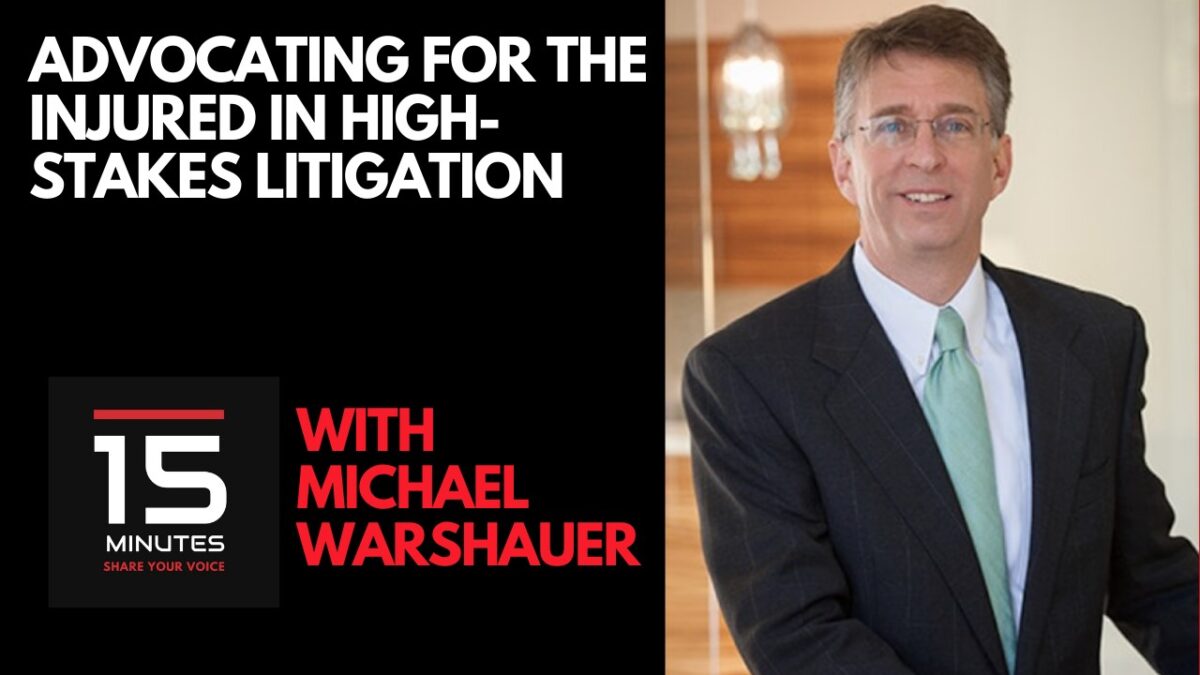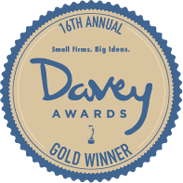
Advocating for the Injured in High-Stakes Litigation With Michael Warshauer


Michael Warshauer is the Senior Partner at Warshauer Woodward Atkins, a law firm specializing in catastrophic personal injury and wrongful death cases. With over 40 years of experience as a trial lawyer, Michael has numerous record verdicts and is known for his creative approach to complex legal challenges. He served as the president of the Georgia Trial Lawyers Association and as a member of the Board of Governors of the American Association for Justice. His practice primarily focuses on significant cases involving medical malpractice, product liability, and various types of accidents, leveraging a team approach to vigorously defend these costly cases. Michael is also a board-certified civil trial advocate, a Georgia Super Lawyer for 19 consecutive years, and holds an AV Preeminent rating from Martindale-Hubbell.
Here’s a glimpse of what you’ll learn:
- [1:31] Michael Warshauer talks about what they do at Warshauer Woodward Atkins
- [4:25] How Michael and his firm are helping other law firms
- [14:09] What percentage of cases go to trial versus being settled out of court?
- [16:07] The legal skills and mindset needed for trial preparation
- [20:14] Four things Michael looks at before deciding to take a case
- [27:38] What motivated Michael to become an attorney
- [33:05] Michael’s advice for clients and aspiring lawyers
In this episode…
In a world where legal battles can stretch on for years, and the stakes are life-changing, how does one ensure that justice is not only sought but achieved? What does it take to advocate effectively for those who have suffered catastrophic injuries?
According to Michael Warshauer, a seasoned trial lawyer with a focus on catastrophic injury and wrongful death, successful advocacy in these high-stakes cases requires a deep commitment to ethical practice and a client-centered approach. He highlights the importance of being prepared to go to trial, even if a settlement is more likely, as it positions a case more favorably from the outset. This readiness, Michael explains, compels opposing parties to offer fair settlements, thereby upholding the rights of the injured and setting precedents that benefit society at large.
In this episode of 15 Minutes, host Bela Musits talks with Michael Warshauer, Senior Partner at Warshauer Woodward Atkins, about the intricacies of high-stakes litigation. They discuss the critical role of ethics in legal practice, the strategic importance of trial preparedness, and the societal impact of thoughtful litigation. Michael also offers advice to clients and aspiring lawyers on ensuring effective legal representation and maintaining ethical integrity in their practices.
Resources mentioned in this episode:
- Bela Musits on LinkedIn
- Gladiator Law Marketing
- Michael Warshauer on LinkedIn
- Warshauer Woodward Atkins
- Georgia Trial Lawyers Association
- American Association for Justice
Sponsor for this episode…
This episode is brought to you by Gladiator Law Marketing, where we deliver tailor-made services to help you accomplish your objectives and maximize your growth potential.
To have a successful marketing campaign and make sure you’re getting the best ROI, your firm needs to have a better website and better content. At Gladiator Law Marketing, we use artificial intelligence, machine learning, and decades of experience to outperform the competition.
To learn more, go to gladiatorlawmarketing.com or schedule a free marketing consultation. You can also send an email to adam@gladiatorlawmarketing.com.
Episode Transcript
Intro 0:01
You’re listening to 15 Minutes, where we feature community leaders sharing what the rest of us should know, but likely don’t.
Bela Musits 0:12
Hello, listeners. I’m Bela Musits, host for this episode of the 15 Minutes Share Your Voice podcast, where we talk with top notch law firms and attorneys about what it takes to grow a successful law practice. This episode is brought to you by Gladiator Law Marketing. They deliver tailor made services to help your law firm accomplish its objectives and maximize your growth potential to have a successful marketing campaign. And to make sure you’re getting the best return on investment. Your firm needs to have a better website and better content. Gladiator Law Marketing uses artificial intelligence, machine learning and decades of experience to outperform the competition. To learn more, go to gladiatorlawmarketing.com where you can schedule a free marketing consultation. Today’s podcast guest is Michael Warshauer. Michael is a trial lawyer who represents people who have been catastrophically injured or killed. In his 40 years of being a trial lawyer, he has obtained numerous record verdicts. He has also been a leader in the legal profession, having been the president of the Georgia Trial Lawyers, and a longtime member of the Board of Governors of the American Association of Justice. Welcome to the podcast, Michael.
Michael Warshauer 1:28
Glad to be here. Good morning.
Bela Musits 1:30
Yeah. Good morning. So tell us a little bit more about the firm.
Michael Warshauer 1:31
Our firm has five lawyers, we limit our practice pretty much to catastrophic injuries and wrongful death. That can be caused by a variety of things, from medical negligence to product liability to train wrecks, to truck wrecks, the common denominator being that we’re at a stage in our practice, where we think the best use of our time and efforts is on larger cases. And we’ve sort of developed that expertise of having sort of a cohesive team approach to cases that allows us to really do a good job on these larger cases that are more complex. They’re defended more vigorously, and they certainly cost a lot more to prosecute.
Bela Musits 1:31
Yeah, yeah. So what’s your role at the firm?
Michael Warshauer 2:25
Well, I guess I’m by virtue of being the oldest at some level, I’m the senior partner here. And part of that job is to sort of set the tone on how we do things, which isn’t really hard to do, because if you’re surrounded by people who are very client focused, very ethics focused, very results focused. It’s not hard to keep everybody going the right direction. But sometimes Encouraging teamwork. reminding people that quality work is paramount. That can be an interesting task. We have a very good team of professional paralegals. And making everyone understand that it’s it’s not my case. I don’t want to work on that case. But it’s the firm’s case it’s client’s case. Maybe that’s my most important role.
Bela Musits 3:28
Yeah, yeah. Nice. So you guys are located in Georgia.
Michael Warshauer 3:32
Where in Georgia, but we’re an Atlanta based firm in the not really a suburb, but the neighborhood Vinings which is just inside the perimeter, not far from the Braves stadium. Our practice, however, literally is the entire state for most of the things we do. And some of the things we do. It’s basically the entire country. I say, people will ask us some certain kinds of product liability cases to come in and help them literally everywhere from Texas to New York to right now. Literally, we’re working helping on cases and gosh, Illinois, New York, Ohio, all over the place.
Bela Musits 4:21
And when you say helping, are you helping other law firms?
Michael Warshauer 4:25
We do. So probably the majority of our firm’s practice is in the role of being brought in by another law firm. Hmm. And that’s an interesting conundrum. You said we were going to talk a little bit about advice to younger lawyers. And that really advice to all lawyers is when you have a case and you don’t feel that you can find the absolute best service for the client. Or maybe you feel that you can’t take that risk or may Do you feel that you could do a good job, but you’d rather just not learn that area of law? You bring in another law firm. And that’s what we do a lot. We’re brought in by the law firms. Some of them are bigger than us, but don’t do what we do. Some are smaller sole practitioners or firms that have a different business model, where it’s more volume than it is single cases. Yeah, what’s important about that Bale is that, gosh, nobody likes to lose a case. Nobody likes that loss for the client. Nobody likes that loss for the law firm. But if you could imagine, you’re having a pretty successful law firm. And you put $200,000 into a case. And it’s your one big case. And you lose it. Oh, my gosh, how do you fill that up? With normal size fees, if you will? So we’re in a position. We certainly don’t ever want this to happen. But it does. We’re if we do lose, because our next case is probably pretty big. The shovel we use to fill the hole is a pretty big shovel. Yeah. So lots of firms bring us and I think it’s the ethical thing to do we do the same thing. It’s we find a case that we’re not feel like we’re the best for we would bring in another firm.
Bela Musits 6:29
So how do other firms find you? And how do you develop that reputation of of being, you know, having deep knowledge and expertise in specific areas?
Michael Warshauer 6:38
Well, the first way you do it is to walk the walk, actually have that knowledge, actually have that expertise, actually get good results at trial. Other ways to do it. And I know you said that variety of lawyers and younger lawyers, potentially law students, so watch them, just get out and about and try to become the teacher at Continuing Legal Education Conference. Because when you do that, you’re doing two things, maybe three, you’re having to really learn that subject, you don’t want to get up there and look at a room of 150 lawyers, and not be the smartest guy in the room on that subject. So you got to learn the subject, that’s a good thing that gives you an opportunity to really dig deep on something that you might have known a lot about. But now you can teach it. The other is, you get to teach other lawyers. And that’s important, it raises a rising tide raises all ships, smarter lawyers are better for the public better for everybody. And the third one is, it’s marketing. It’s just marketing, there’s no question about it, that when you have an opportunity to teach, when you have an opportunity standard five lawyers, and you do a good job, you’re polishing your reputation, hopefully in a positive way. And I think when my lawyers, my lawyers, our firm’s lawyers do that on a regular basis, and we do a good job and get good scores, if you will, as teachers, and part of the reason is we do take it seriously. So how do you develop that reputation is walk walk through the work and and maintain good reputations with the courts, maintain good reputations with defense counsel, maintain good quality clients first. Ethics, if you will, and let other lawyers know and we don’t do the very best job at that, frankly, we’re not very good at driving. But do be a source of knowledge lawyers call me every day. Hey, Michael, do you have this brief? Have you encountered this before? We send it out. We don’t ever charge other lawyers for it’s part of our obligation to the profession to share what we know and help a lawyers do a better job for their own clients.
Bela Musits 9:07
Yeah, that’s a that’s a really good point. You know, I’ve often thought that doing seminars and workshops, giving talks at conferences is really a superb way of sort of establishing your credibility. And like you said, marketing, but it’s a subtle way of marketing. It’s not You’re not buying an ad, you know, in a magazine. So, I think I think that’s a great way and it establishes that credibility for you. And, and the other thought I had while you’re while you were saying that is inside any specific industry, people know who the good people are. People know who the ethical people are, right? You develop this reputation over time. And and that’s a that’s a reputation that is is is generated because of the thing stuff that you do. And people watch you in that industry, because you see each other multiple times, whereas a client, you might just see for, you know, three or four months, and that the case is over. And that’s it. So I think that’s a, that’s a great tip and a great way for, for people to think about in all professions of sort of, you know, establishing their credibility in, in an industry.
Michael Warshauer 10:23
There was two words and your last couple of sentences, one I agree with, and one, I don’t, you said industry. Lawyers who believe we work in an industry have put money above ethics. It is, first and foremost a profession. And as a profession, your obligation to act professionally comes before your goal to support your family and make a fortune so to speak. And when I see, ah, well, I had to say this very delicately. So delicacy is on this subject is not something that you have a go. And that is there are people who advertise, encourage people to hire them. And they frankly, never are going to do the work. They are in an industry. And then there are people like our firm who want to do the work, and want to do it at the very highest quality. And that’s important. I can give you an example, just a week ago, or so we settled the case, medical negligence case, we felt we had a very strong case, but like all cases, it can be lost. We had a very fragile client. And what I mean by that is had we lost, which is always a chance. It would have been devastating to her devastating to the point where I’m not sure she would have survived it. And if we tried this case, we felt that we would have had, you know, front page of the legal newspaper kind of verdict. And we get those. Those are important. That’s part of your marketing, as I said a moment ago, get the results. People need to know about that. Yeah. But at the end of the day, when we talked about whether we settle this case for what we thought was a relatively small percentage of the potential verdict. What we said is, we’ve come too far to put us our interests in a big verdict ahead of our clients interest in security, safety and sanity. And I think that’s an important goal for lawyers to keep in mind is that at the end of the day, it’s not about getting the big verdict for you. It’s about controlling your clients risk guaranteeing as best you can their future. Now, does that mean that we’re going to settle every case? No way. I think I say on our firm website, we have a little talk like this little speech, said that one of my mentors, said if it’s not the right amount, and the difference is only $1,000. But it’s not the right amount. You’re going to be ready to go to trial.
Bela Musits 13:33
Yeah, yeah. Well, I appreciate your comments about profession versus industry. And I agree with you profession is a much better word. And much closer to what my brain was thinking when I made that. So thank you for pointing that out. So let’s talk about trial. So what what sort of percentage of cases go to trial versus settled out?
Michael Warshauer 13:55
Oh, I’m sure somebody can give the exact numbers, but it’s in the 90s that settle that settle. The vast majority of cases settle.
Bela Musits 14:06
And that’s true in your in your firm as well? That percentage?
Michael Warshauer 14:09
We are probably lower than average. And keep in mind, there’s two reasons for that. One is, we’re lower than average. Because if we try one case, given the total number of cases that we have, it skews our numbers. I say that one case can make a difference. If I had 100 cases and tried seven. Well, I have a 93%. Settlement. Right, right. But if I had 50 cases, and tried seven, well now I’m down to 86% at a time, right? Yeah. So the point is that because we have a very low number of cases per lawyer, probably in the 12 to 15 range. Even if I try only a few, I’m going to be trying more than the national average. So that’s one reason. It’s just simple math. The second reason is we’re stubborn. And we we decide what we think is fair. We get buy in from our clients that that’s fair. We test that number a variety of ways, focus groups, peers, past experience, the site is fair. And if it’s paid great, and if it’s not, we’re going to try. So I think one of my partners, I was talking to her the other night. And she said she’d never settled the case at mediation, like one case, a lawyer long time ago. How’s that even possible? And she’s just done. Yeah, not a bad way. Some of us have had better results in mediation, and maybe it’s because they know we’ll go to trial. There’s a saying phrase applies towards that does try, right? You want peace? Be ready for war? If you want settlement be ready for trial?
Bela Musits 16:12
Yeah, yeah. So I can imagine that the skill set of the attorney may be significantly different for those who are headed to trial and sort of what goes on in a trial versus what is happening in mediation or just negotiations.
Michael Warshauer 16:28
I think it is a big difference in skill set, but it’s also a difference in mindset. I can I mean, you know, podcasts always been something colorful. So let me give you a colorful story. When I long time ago, I represented really, really rich people who owned Arabian horses. And Arabian horses were like $20 million apiece. And so when you bred these horses, the offspring were worth a fortune and the stud fee was a fortune. And so you had to witness it. You couldn’t take the chance that your mayor was being inseminated by some Saddlebred horse, right? So we have two $20 million horses, and they’re big, they weigh a lot, and they’re violent, they bite and they kick and they hurt each other. So you want to minimize the time it takes for them to achieve this process. So you bring in a stallion who excites the mayor, but he never, he might be an $800 Saddlebred horse, but he never gets finished. He’s called a teaser pump. Okay, yeah, there are lawyers who never tried cases. At the end of the day, they’re teaser ponies. And by that, I mean, we watch them take a deposition. And they will ask the witness, look at this photograph. It’s on video. Look at this photograph, and the witness looks at the photograph and they hold the photograph just like I’m holding this flat camera never sees it. Why don’t they have the witness do this? There’s a reason for that. They don’t know how that’s gonna play at court. They’ve never been to court. Maybe they did a long time ago. Yeah. So that there’s a different skill set. There’s a different skill set and and how you take a doctor’s deposition for use a trial. It’s a different skill set. And knowing what your case is about, I think somebody who’s tried a lot of cases, at the end, I teach this when I teach CLS, the very beginning, I’m looking at the jury instructions. What is the jury instruction going to tell this jury? A, B, C, D? Let’s get the facts. A, B, C, D. And I know that from the very beginning, I’m preparing for that jury instruction. I’m not doing my jury instructions, two weeks before trial or the night before trial. Yeah. When you have the mindset that I’m going to trial, you don’t think, well, I need to wait, I’m not gonna want to spend time on jury instructions. That’s a year and a half from now. Make the mindset, I’m going to trial, get your jury instructions, know the recipe for success. That’s what the jury instruction is at the end of the day. And put all the ingredients and so that when you get to the cake baking time, when you get to the trial, you’re set. And I think that’s the difference in skill set is the difference in mindset. And I think that defendants know it and they pay more to law firms that they know, are putting the case together with the ultimate goal of trying it even if we don’t try it.
Bela Musits 19:51
Yeah, yeah, that makes a lot of sense. So Michael, let me ask a question. If I call let’s say I was in an accident, got really catastrophically injured. And I called up your firm. And I said, Hey, I think maybe I have a case here. And I understand you guys are really great. I’d like you to represent me, can you take me through, you know, kind of at a high level what that process would be like?
Michael Warshauer 20:14
Well, sure. The first thing, I can take you through the process that how I evaluate every case, whether we want to take it or not. And same thing I tell the client during the initial call, we’re going to be looking at basically four things. And this sounds horrible, but we have to find out if the other side has any money, or they don’t have any money. It’s not a case that generally fits our business model. Now, sometimes we take cases because it’s the right thing to do. But that has to be a conscious choice. The second thing we look at is how bad you’re hurt. Doesn’t really matter how bad you’re hurt, if there’s no ability for us to get you compensation. That’s a waste of your time, it’s a waste of our resources. The third thing we look at is is it the other side’s fault. Again, if you’re not hurt bad enough to match our needs, our business model, keep in mind that every time I’ll work on a case, I’m taking away time from working on another case. So I would love to work on every case that comes in the door. But I dilute my skill set when I do so. And if I work on a smaller case that another lawyer could handle just fine. I’m really hurting my clients who are waiting on me to get their bigger case system. So we’ve looked at money. We’ve looked at injury we’ve looked at is it their fault? And then the fourth thing that I always look at, is there something is there a sex appeal about this case, positive or negative? The example I often use is if you had an intersection collision, two identical intersection collisions. One is a lovely woman going on her way to teach church choir practice. And she’s hit by a meth dealer as he runs a red light. The other is a meth dealer, who’s hit by a little old lady going to church prac choir practice drops her Bible and when she reaches over to picks it up, accidentally runs red light, the injuries are identical. One of them has negative sex appeal, the other has positive sex appeal. I think you can figure out which one. So those things can sometimes tip a case that doesn’t perhaps have great damages. It might even tip a case where we think this is an important social thing to do. Like one of the cases that I want to do right now, is I want to find a pot dealer who has lice pot with fentanyl. And I want to sue him, or I didn’t get a zillion dollar verdict against him. Yeah. Does. He’s a menace to society? And am I ever going to collect it? No. But do I want to send a message to the world smell like I’m a pot smoker, I don’t even drink. That’s not the point. The point is, somebody needs to bring people, the system can work in changing the way people do things. And so you know, that was a weird example. But there are kinds of cases where there’s something about the case that makes it safe and dry law firm.
Bela Musits 23:38
Yeah, well, actually, I think your your meth dealer is a great example, because it shows the potential impact that that you and your profession can make, when maybe other parts of of society are maybe dropping the ball or not doing enough, right. So you have the ability to sort of have that kind of impact that other parts of society may not be able to add?
Michael Warshauer 24:09
Well, I think we do. I can give you a couple of examples. One of the things that I have done for a long, long time is represent railroad workers who can sue their railroad employer under a special statute called the Federal Employers Liability Act. Early in the early 90s, we had hundreds if not maybe over 1000. I don’t know how many cases for railroad workers who had hearing loss, noise induced hearing loss. They were not allowed to wear hearing protection on the property. Now, you cannot be within 50 feet of an idling locomotive without hearing protection. That’s something that my law firm had something to do with. Yeah, rule is now nationwide, every railroad has that. And that was absolute Because of litigation. I give you another example that that’s really sort of heart wrenching to me. And that was a trauma surgeon that and I can’t remember what kind of surgeon he was. But he had done a tracheostomy on a young woman who had been really seriously injured in a car wreck and put it in at the wrong level. And because he put it at the wrong level, it’s a sort of an L shaped thing that goes down into your lungs to help you breathe. The carotid artery goes right behind it, and every time the heartbeat that rubbed against the back in the trachea, like a back of a shoe on your heel, and it wore through the artery. And the young woman died. Horrible, horrible death that she should not have done. And when deposing the doctor, I came to discover that somehow in his medical training, no one ever taught him how to do it. And part of that settlement was, he had to go back and document that he had recurrent training and how to do this. So did we want a bad doctor was just a doctor screwed up in a bad, bad way. And it’s not like the world needed to get rid of him as a doctor, you will continue to provide good medical care to people at least I hope so. But I know this, he will never make that mistake again. Because he’s been trying to do it. Right. Right. And that was a result of our law firm. Yeah. And that’s happened, those are one affected 1000s of people, 1000s of workers. And the other was a result of one event. But both of which change the trajectory of how things are done. And I think law, lawsuits can do that. When we look at our house and you see a child’s vaporizer for their room. Those are all plastic now. It used to be glass, glass work until it broke and children were scolded, lawsuits did that. And there’s numerous examples of where lawsuits have changed the product or the way we do things in a better way.
Bela Musits 27:25
Now, that’s excellent. Those are some really great examples. So I’m always curious about why people choose specific professions. So what was sort of motivation for you to become an attorney?
Michael Warshauer 27:38
You know, my father was a lawyer, later a judge. So it was always something I was familiar with. And I don’t know. I mean, I can remember the day I decided to do it. I took the LSAT more as well. It’s kind of one of the things to do. And I’d literally opened the mail and I majored in finance. This was 1980, I guess the spring of 1980. And majored in finance and the Dean of the Business School calls and says, Hey, I get by choice to place one or two students with this New York investment bank. You’re my man. So Dean, I just got my LLC, to results. I’m your law school. And I remember that conversation because I had not committed to the process until I had this. This why, if you will, you’re left is banking in New York City and whatever. Wolf of Wall Street future held, and the other is law school. And so I went to law school and I love it. I loved everything about it. I loved being a law student. I love my classmates. I performed well in law school. I got out I I remember that very, very good family friend. And we’re close families kind of, you know, share holidays together and gather around at the holiday dinner, and we both had to work that day. And he says, I hated today. I hated yesterday. I hated everything about being a lawyer for the last 20 years. Yeah, I said it was all I could do to pull myself away to get here. I was writing a brief. I was into it. I admit, I had my mojo. Every Senate’s was coming together. And I found the path to victory, if you will. And so I’ve liked it. I like it intellectually. And I’ll tell you why I’m a lawyer. I represented the fella once who had a horrible amputation, double amputation. The defendant said it was his fault. For years he lived with the idea that it was his fault. I never thought it was his fault. We had to try that case twice. We lost it the first time. But in true true fashion, we didn’t give up. We tried it the second time, we got a very, very big product. Eight fingers, whatever. And the client hugged me. And he said, I didn’t do it. It’s not my fault. That’s all heard. percentage of fault attributed to the plaintiff, zero. Not my fault. At least 2030 minutes past we’re in the lobby, the elevator, we’ve cleaned up our briefcases, we’re standing around the elevator, we’re all excited. And he goes, Oh, by the way, how much did we get? He never heard that. Yeah, the part that was important to him, that was important to me. First, it was great to get the verdict. I can’t lie. But it gave him peace. It’s not my fault. That was those words, were my greatest victory so far as a lawyer.
Bela Musits 31:19
That’s a great story. Super, super story. Great way to start wrapping this up. So where can listeners learn more about your firm and get a hold of you guys?
Michael Warshauer 31:29
Well, we’re in Atlanta. But again, we practice all over the place for the right case, where it meets the needs of the client and our model, if you will. Our website is warlawgroup.com warlawgroup.com It’s a good place to go. We haven’t been perfectly this, but a lot of the CLE materials that we’ve written over the years are there, it’s a good source for lawyers to look and gather things. When clients are like people read the stuff we’ve written keep in mind that was 99% of it was written for a lawyer. audience. And of course, we’re always just phone call away. Yeah. And what’s interesting about that bail is that we don’t really screen our calls. I mean, there is a somebody with new clients find out initially, but once you’re the client, you call and you say, let me speak to Michael, let me speak Mr. Warshauer. They don’t say, What’s your name? What are you calling about? What cases? They’re not allowed to do that I find it offensive. And I think clients appreciate the idea that we’re never hiding right here. So where to find this? Right there on the phone all the time. Super, super.
Bela Musits 32:56
So Michael, is there? Is there something that I’ve not asked you that you’d like to share with our listeners?
Michael Warshauer 33:03
I don’t know. I’ve rambled on a good bit. I think what I share with listeners is this. Only two things. If you want to be a lawyer, don’t do it unless you’re going to love it. It’s a very jealous mistress. And if you don’t have the reciprocal love, you’re not going to be good at it. That’s for lawyers, and law students and college students who might see this. Yeah, don’t do it. there plenty of lawyers. We don’t need ones who hate it. And the second is for clients, make sure you’re comfortable with the law firm. And make sure that they have not only the skills but the financial ability to turn down the skills to get a big verdict or big settlement. But also the financial ability to turn down a settlement. That’s not right. And that can be difficult for a lawyer who this is the highest fee I’ve ever earned. I have to turn it down. Yeah. So just look at those two things and make sure you’re comfortable.
Bela Musits 34:20
Excellent. Great way to wrap this up. Michael, thank you so much for being a guest on the podcast. I really enjoyed our conversation.
Michael Warshauer 34:29
Well, my pleasure. Good luck.
Bela Musits 34:31
Thank you.
Outro 34:34
Thanks for listening to 15 Minutes. Be sure to subscribe and we’ll see you next time.












